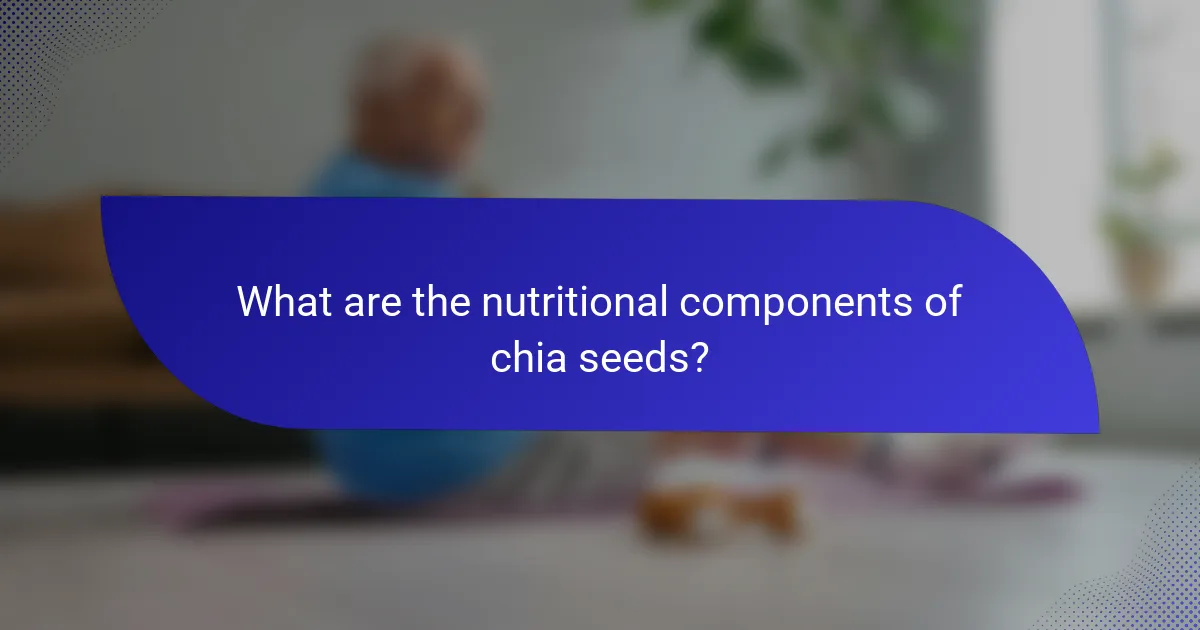Chia seeds provide a powerhouse of nutrients that can enhance your health. They are high in fibre, protein, and omega-3 fatty acids, supporting digestion and heart health. This article explores their nutritional profile, outlines key health benefits, and offers versatile recipes for incorporating chia seeds into your diet. Discover how these tiny seeds can make a big impact on your wellness journey.

What are the nutritional components of chia seeds?
Chia seeds are rich in nutrients, offering high levels of fibre, protein, omega-3 fatty acids, and essential minerals. Their nutritional profile includes approximately 17 grams of fibre, 4 grams of protein, and 5 grams of omega-3s per ounce. These seeds provide antioxidants and are low in calories. As a result, they support heart health, improve digestion, and promote weight loss. Recipes often include chia pudding, smoothies, and baked goods, showcasing their versatility in various diets.
How do omega-3 fatty acids in chia seeds benefit health?
Omega-3 fatty acids in chia seeds significantly benefit health by supporting heart health, reducing inflammation, and improving brain function. These seeds are rich in alpha-linolenic acid (ALA), a type of omega-3 that promotes cardiovascular health and lowers cholesterol levels. Regular consumption can enhance cognitive performance and may help alleviate symptoms of depression and anxiety. The high fibre content in chia seeds also aids digestion, while their antioxidant properties protect cells from damage.
What vitamins and minerals are found in chia seeds?
Chia seeds contain essential vitamins and minerals, including calcium, magnesium, phosphorus, and zinc. These nutrients contribute to bone health, muscle function, and overall well-being. Chia seeds are also rich in omega-3 fatty acids, antioxidants, and dietary fibre, enhancing their nutritional profile.
How does the fibre content in chia seeds support digestion?
Chia seeds support digestion primarily due to their high fibre content, which aids in regular bowel movements. The soluble fibre in chia seeds absorbs water, forming a gel-like substance that helps to soften stool and promote gut health. This property can alleviate constipation and enhance overall digestive efficiency. Additionally, chia seeds contain both soluble and insoluble fibre, contributing to a balanced digestive process. Regular consumption can lead to improved satiety, potentially reducing overeating.

What health benefits are associated with chia seeds?
Chia seeds offer numerous health benefits, including improved digestion, enhanced heart health, and increased energy levels. They are rich in omega-3 fatty acids, fibre, and protein, contributing to weight management and reduced inflammation. Additionally, chia seeds can help stabilise blood sugar levels and support bone health due to their calcium content. Incorporating chia seeds into recipes, such as smoothies or puddings, can easily enhance nutritional intake.
How can chia seeds aid in weight management?
Chia seeds can aid in weight management by promoting satiety and reducing appetite. Their high fibre content, approximately 34 grams per 100 grams, absorbs water and expands in the stomach, which helps control hunger. Additionally, chia seeds provide essential nutrients, including omega-3 fatty acids and protein, which support overall health during weight loss. Incorporating chia seeds into meals can enhance nutrition while assisting in weight control.
What role do chia seeds play in heart health?
Chia seeds significantly contribute to heart health due to their high omega-3 fatty acid content. These seeds help reduce inflammation, lower blood pressure, and improve cholesterol levels. Rich in fibre, chia seeds promote healthy digestion, which indirectly supports cardiovascular health. Incorporating chia seeds into smoothies or salads can enhance heart-healthy diets.
How do chia seeds impact blood sugar levels?
Chia seeds can help stabilise blood sugar levels due to their high fibre content. The soluble fibre in chia seeds slows down digestion and glucose absorption, reducing blood sugar spikes. Studies indicate that incorporating chia seeds into meals can improve glycaemic control, making them beneficial for people with diabetes. Additionally, chia seeds provide omega-3 fatty acids, antioxidants, and essential nutrients that support overall health.

Which unique properties of chia seeds enhance their nutritional value?
Chia seeds possess unique properties that significantly enhance their nutritional value. They are rich in omega-3 fatty acids, providing 5 grams per ounce, which supports heart health. Additionally, they contain a high fibre content, with 11 grams per ounce, promoting digestive health. Chia seeds are also a complete protein source, offering all nine essential amino acids, making them beneficial for muscle repair and growth. Their ability to absorb water, expanding to 10-12 times their weight, aids in hydration and satiety, which can assist in weight management.
What makes chia seeds a complete protein source?
Chia seeds are a complete protein source because they contain all nine essential amino acids. This unique attribute makes them an excellent choice for vegetarians and vegans seeking quality protein. In addition to protein, chia seeds are rich in fibre, omega-3 fatty acids, and various micronutrients. Their nutritional profile supports muscle repair, weight management, and overall health. Incorporating chia seeds into recipes enhances both texture and nutritional value.
How do chia seeds’ gel-forming abilities contribute to health?
Chia seeds’ gel-forming abilities enhance health by promoting hydration and aiding digestion. When mixed with liquid, chia seeds absorb water and swell, forming a gel. This process slows digestion, leading to prolonged feelings of fullness. Additionally, the gel can improve gut health by acting as a prebiotic, supporting beneficial bacteria. Chia seeds are also rich in omega-3 fatty acids, fibre, and antioxidants, making them a nutritious addition to various recipes.

What are the various ways to incorporate chia seeds into meals?
Chia seeds can be incorporated into meals in various ways, enhancing both nutrition and flavour. Here are some effective methods:
1. Add chia seeds to smoothies for a nutrient boost.
2. Mix them into yoghurt or oatmeal for added texture.
3. Use chia seeds as an egg substitute in baking.
4. Sprinkle on salads for extra crunch.
5. Create chia pudding by soaking seeds in milk or a milk alternative.
6. Incorporate into energy bars or granola for additional fibre.
Which recipes highlight the versatility of chia seeds?
Chia seeds can be used in various recipes, showcasing their versatility. They are excellent in smoothies, puddings, baked goods, and salads. For example, chia seed pudding combines chia seeds with milk or a milk alternative, creating a nutritious breakfast. Chia seeds can also be added to smoothies for extra fibre and omega-3 fatty acids. In baking, they can replace eggs in vegan recipes, providing binding properties. Additionally, sprinkling chia seeds on salads enhances texture and nutritional value.
How can chia seeds be used in smoothies and drinks?
Chia seeds can enhance smoothies and drinks by adding nutrition and texture. They provide omega-3 fatty acids, fibre, and protein, making beverages more filling and nutritious.
To use chia seeds in smoothies, blend them directly or let them soak in liquid for 10-15 minutes to form a gel-like consistency. This method improves texture and aids digestion.
For drinks, chia seeds can be added to water, juice, or herbal teas. They absorb liquid, creating a refreshing, hydrating beverage.
Recipes can include chia seed smoothies with fruits like bananas or berries, or chia-infused lemonades for a nutritious twist.
What are some creative dessert ideas using chia seeds?
Chia seeds can be creatively used in various dessert recipes. They are versatile and nutritious, enhancing both flavour and health benefits.
1. Chia Seed Pudding: Combine chia seeds with almond milk, vanilla extract, and a sweetener. Let it sit overnight for a creamy texture.
2. Chia Seed Jam: Mix chia seeds with mashed fruit and a sweetener. Allow it to thicken for a delicious spread.
3. Chia Seed Brownies: Incorporate chia seeds into brownie batter for added fibre and omega-3 fatty acids.
4. Chia Seed Smoothie Bowl: Blend fruits with chia seeds and top with granola and nuts for a nutritious breakfast or dessert.
5. Chia Seed Cookies: Add chia seeds to your favourite cookie recipe for an extra nutritional boost.
These desserts leverage the health benefits of chia seeds, including their high fibre content and ability to promote satiety.

What are the common mistakes to avoid when using chia seeds?
Common mistakes to avoid when using chia seeds include not soaking them, consuming them in excess, and neglecting proper storage. Not soaking chia seeds can lead to digestive discomfort, as they absorb water and expand. Consuming excessive amounts may cause bloating or gastrointestinal issues due to their high fibre content. Lastly, improper storage can reduce their nutritional quality, as exposure to light and air can cause them to go rancid.
How can improper preparation affect the benefits of chia seeds?
Improper preparation can significantly diminish the health benefits of chia seeds. For example, not soaking them can lead to digestive discomfort and reduced nutrient absorption. Chia seeds contain soluble fibre, which requires hydration to expand and deliver their full benefits. Additionally, failing to grind chia seeds may limit the bioavailability of certain nutrients, such as omega-3 fatty acids. Proper preparation enhances nutrient release, ensuring maximum health benefits.
What portion sizes are recommended for optimal health benefits?
A recommended portion size of chia seeds for optimal health benefits is about 1 to 2 tablespoons daily. This amount provides essential nutrients and omega-3 fatty acids while promoting digestive health. Consuming this portion can help enhance satiety and support weight management. Additionally, chia seeds can be easily incorporated into various recipes, such as smoothies or oatmeal, to maximise their health benefits.
How do you ensure the freshness and quality of chia seeds?
To ensure the freshness and quality of chia seeds, store them in a cool, dark place in an airtight container. This prevents exposure to moisture and light, which can degrade their quality. Chia seeds have a long shelf life, typically up to two years when stored properly. Regularly check for any off smells or changes in texture, which may indicate spoilage. Additionally, purchasing from reputable brands can help guarantee quality and freshness.